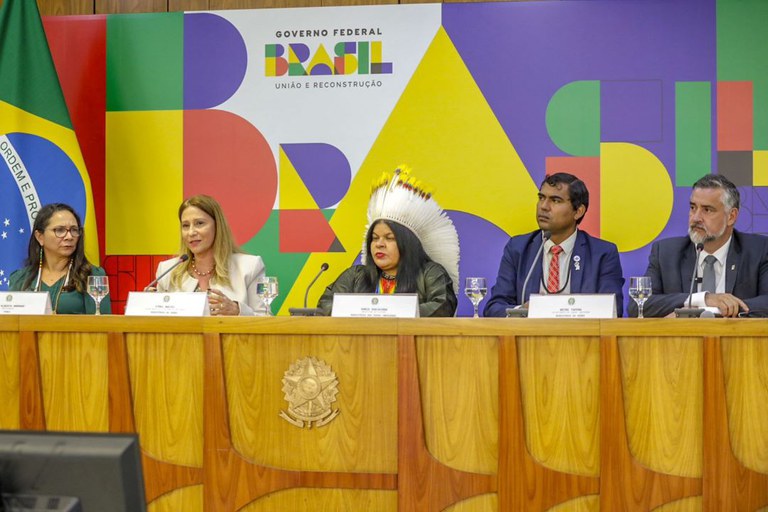Notícias
INDIGENOUS PEOPLES
Federal government announces first indigenous hospital in Roraima and other actions

Press conference on the announcement of Federal Government measures for the Yanomami indigenous territory, this Thursday (22), at the Planalto Palace
At a press conference held on Thursday, February 22, at the Planalto Palace, the Minister of Indigenous Peoples, Sonia Guajajara, announced new permanent actions for the more than 30,400 inhabitants who live in the Yanomami indigenous territory. Federal investment for the region in 2024 will include BRL 1.2 billion in extraordinary credit.
We have moved away from emergency actions to permanent actions with the installation of the Casa de Governo (Government House) in Boa Vista (RR). There will be 13 government bodies there to monitor and guarantee the implementation of the actions needed by the territory’’
Sonia Guajajara, Minister of Indigenous Peoples
"We have moved away from emergency actions to permanent actions with the installation of the Casa de Governo (Government House) in Boa Vista (RR). There will be 13 government bodies there to monitor and guarantee the implementation of the actions needed in the territory," said the minister, announcing that a delegation will go to the capital of Roraima next week to continue dialoguing with the community, attending to the needs of the local peoples.
Among the announcements is the plan to build the first indigenous hospital in Boa Vista, for specialized medium and high-complexity care services. "We already have an entry protocol, and now we need to think about a differentiated model of assistance, with hammocks, seeking dialogue with the population to ensure the particularities of assistance to the Yanomami population and the indigenous peoples of Roraima," highlighted the Secretary of Indigenous Health of the Ministry of Health, Weibe Tapeba.
He said that the intention is to sign a protocol of intent with the Federal University of Roraima and the Brazilian Hospital Services Company (Ebserh) to start construction of the hospital unit later this year.
Other measures planned for Yanomami health care include the construction and renovation of 22 more basic indigenous health units, the complete renovation of the Casa de Apoio à Saúde Indígena (Indigenous Health Support House - Casai) in Boa Vista, as well as the construction of a reference center against undernutrition in the Surucucu region. "We are thinking of a new indigenous health policy, one that is bold and resolute, and guarantees comprehensive care for the indigenous population," affirmed Tapeba.
INTERNATIONAL PRIORITY - In 2023, the World Health Organization (WHO) approved a resolution presented by the Brazilian government, which ensures the development of an international pact in defense of the health of indigenous peoples. The document includes the health of indigenous peoples as a priority issue on the organization's agenda, in order to advance systems that promote specific actions for this population. Following this agreement, the Ministry of Health is elaborating a new Indigenous Health Policy, based on national and regional workshops.
CASA DE GOVERNO (GOVERNMENT HOUSE) - The Casa de Governo (Government House) should be officialized at the beginning of March. A physical space will be set up, a local coordinating office of the Union in Roraima, which will constantly and personally manage actions involving federal agencies such as the Federal Police, Funai and Ibama, and will also be attended by representatives from ministries such as Education and Human Rights. With the Casa de Governo (Government House), the idea is to guarantee the full resumption of the indigenous way of life, and to combat illegal actions such as deforestation and mining.
HEALTHCARE HUBS - Closed until 2022, six healthcare hubs were reactivated by the Federal Government last year. These structures provide assistance to more than 5,000 indigenous people in more than 75 villages in Yanomami territory.
AGRICULTURAL PRODUCTION - From the beginning of 2023 until February of this year, the government provided a series of incentives so that indigenous people can resume farming activities within the territory. The communities were given 739 tool kits, 184 pieces of equipment for flour houses, and new gardens were formed for planting food. At the same time, more than 6,000 food assistance packages were provided at the beginning of January alone.
HISTORY - In the first year of actions, more than 21,000 medical consultations were carried out by 960 professionals. There was an increase from nine to 28 in the number of Mais Médicos members, nutritional recovery for more than 400 children, and 140,000 mass tests for the detection of malaria. More than 4.7 million units of medicines and supplies were sent and the Ministry of Health ensured that 59,000 doses of vaccines were applied. On the food security side, 59,000 food packages were distributed.
On the security front, 13 Federal Police operations resulted in 175 arrests in flagrante and BRL 589 million in seized goods, as well as 310 inspection operations.